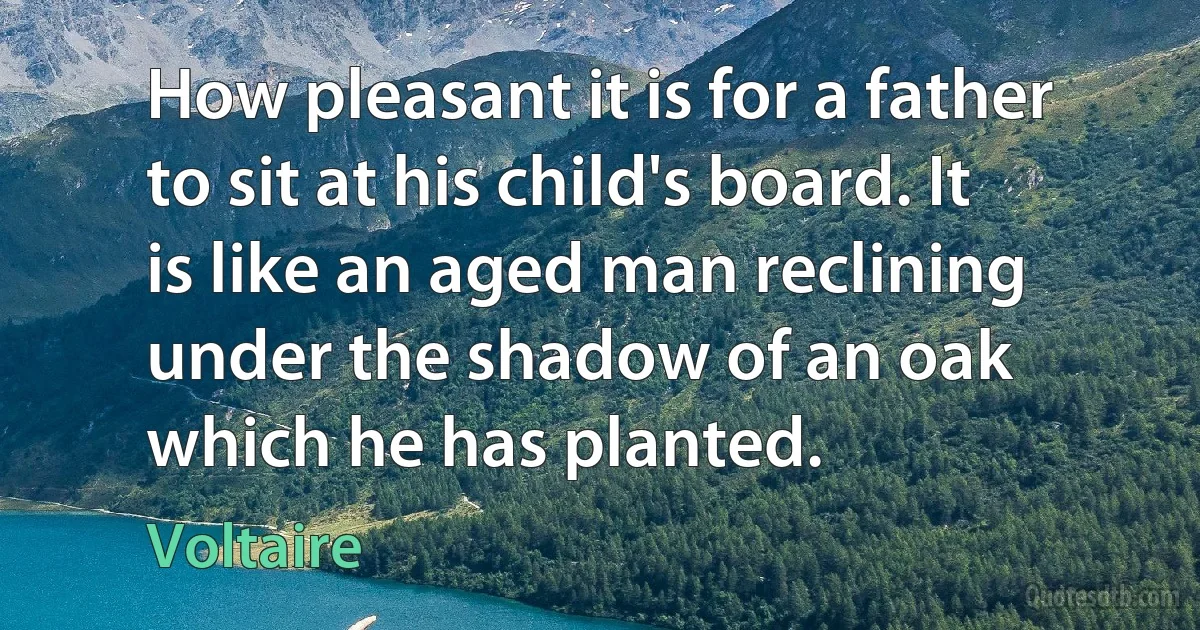Oak Quotes - page 6
Let me tell you about the English War Bow, Joscelyn. It is a simple thing, med of yew, a peasant's tool, really. My huntsman can use one, but he is the only man in Berat who has ever mastered the weapon. Why do you think that is? I'll tell you anyway. It takes years, Joscelyn, many years to master the yew bow. Ten years? Probably that long, and after ten years a man can send an arrow clean through armor at two hundred paces. Splat! A thousand ecus of man, armor, and weaponry fallen to a peasant's bow. And it isn't luck, Joscelyn. My huntsman can put an arrow through a bracelet at a hundred paces. He can pierce mail coat at two hundred. I've seen him put an arrow through an oak door at a hundred and fifty, and the door was three inches thick!

Bernard Cornwell
The dominant concept in Aristotle's philosophy of nature is his notion of causation. ...The final cause states that each substance has an inherent purpose. Thus there must be a purpose or design in the acorn such that it always grows into an oak tree. This aspect of existence is indicated by the word entelechy; this means the purpose that guides things to develop in one way rather than another.

John Freely
When not converging on literally nothing, his pictorial schemes address objects that are either remote, like the moon, or obdurate, like the battered oak. Human figures intercept our gaze and transmit it into ineffable distance. The pictures don't give; they take. Something is drawn out of us with a harrowing effect, which Friedrich's use of color nudges toward intoxication. What at first seem to be mere tints in a tonal range combust into distinctly scented, disembodied hues: drenching purples and scratchy russets, plum.

Caspar David Friedrich
The sun never shined on a cause of greater worth. 'Tis not the affair of a city, a country, a province, or a kingdom, but of a continent-of at least one eighth part of the habitable globe. 'Tis not the concern of a day, a year, or an age; posterity are virtually involved in the contest, and will be more or less affected, even to the end of time, by the proceedings now. Now is the seed time of continental union, faith and honor. The least fracture now will be like a name engraved with the point of a pin on the tender rind of a young oak; The wound will enlarge with the tree, and posterity read it in full grown characters.

Thomas Paine
His great object was to obtain the glitter and sparkle of nature after a shower; and for this purpose, passing by the oak and elm, our two first trees, he took the white poplar and the ash - the one for the leaf, the other for the bark. This I had from himself, and it is a key to his pictures. A French paysagiste [landscape-painter] once came from Paris to request him to show him his method of painting. Constable said he should have been most happy to meet his wishes, but that unfortunately he had no method, and got his pictures up he did not know how. This I had from Mr. Field, who was present.

John Constable
As it now appeared that we had been forced at least two points north of the course we had originally intended to steer, by the northern bearing of the Canadian, we made an effort to cross a ridge of timber to the south, which, after considerable labor, proved successful. Here we found a multitude of gravelly, bright-flowing streams, with rich bottoms, lined all along with stately white oak, black-walnut, mulberry, and other similar growths, that yielded us excellent materials for wagon repairs, of which the route from Missouri, after passing Council Grove, is absolutely in want.

Josiah Gregg
You will say, 'How can chance assemble in one place all the things necessary to produce an oak tree?' My answer is that it would be no miracle if the matter thus arranged had not formed an oak. But it would have been a very great miracle if, once the matter was thus arranged, an oak had not been formed. A few less of some shapes, and it would have been an elm, a poplar, a willow, an elder, heather or moss. A little more of some other shapes and it might have been a sensitive plant, an oyster in its shell, a worm, a fly, a frog, a sparrow, an ape or a man.

Cyrano de Bergerac
Whether it be the sweeping eagle in his flight, or the open apple-blossom, the toiling work-horse, the blithe swan, the branching oak, the winding stream at its base, the drifting clouds, over all the coursing sun, form ever follows function, and this is the law. Where function does not change form does not change. The granite rocks, the ever brooding hills, remain for ages; the lightning lives, comes into shape, and dies in a twinkling.
It is the pervading law of all things organic and inorganic, of all things physical and metaphysical, of all things human and all things superhuman, of all true manifestations of the head, of the heart, of the soul, that the life is recognizable in its expression, that form ever follows function. This is the law.

Louis Sullivan
At the age of thirty, or thereabouts, this young Nobleman had not only had every experience that life has to offer, but had seen the worthlessness of them all. Love and ambition, women and poets were all equally vain. Literature was a farce. The night after reading Greene's Visit to a Nobleman in the Country, he burnt in a great conflagration fifty-seven poetical works, only retaining 'The Oak Tree', which was his boyish dream and very short. Two things alone remained to him in which he now put any trust: dogs and nature; an elk-hound and a rose bush. The world, in all its variety, life in all its complexity, had shrunk to that. Dogs and a bush were the whole of it.

Virginia Woolf
You talk of her mind being unsettled - how the devil could it be otherwise, in her frightful isolation? And that insipid, paltry creature attending her from duty and humanity! From pity and charity. He might as well plant an oak in a flower-pot, and expect it to thrive, as imagine he can restore her to vigour in the soil of his shallow cares!

Emily Brontë


